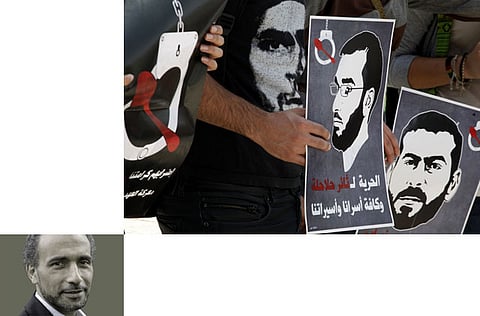Beyond the silence of shame
Time has come for the West and for Israel to heed the lessons of history: the oppressed who resist like the Palestinian hunger strikers are the true victors

About 1,600 Palestinians held in Israeli prisons are demanding respect for their dignity, their innocence, and their humanity. Many have been arrested on mere suspicion; others for no valid reason. ‘Administrative detention' has become accepted practice (as have ‘enhanced interrogation techniques') in Israel's fine and exemplary democracy. Women, men and even children can be arrested without charge, without warrant and held for six months, renewable indefinitely.
Thousands have been languishing in jail for months and years (20 per cent of the total population of the Occupied Territories has experienced incarceration) when nothing can justify their arrest and the degrading treatment inflicted on them by the Israeli administration, which has perpetuated the methods of British colonialism exacerbated by the systematic denial of the humanity of the Palestinians. A splendid democracy indeed!
As the Arab peoples rise up, crying out for liberty and justice — from Tunisia to Egypt by way of Yemen, Libya, Syria and Bahrain — in a spirit of non-violence and human dignity, the Palestinian prisoners are echoing their unarmed resistance. Sixteen hundred are refusing all food to force the end of the degrading treatment they are subjected to day after day. The hunger strikers are Palestinians, some of whom have no idea why they are in prison. But the Israeli government, invoking the fight against terrorism, has imposed a reign of terror and violence, both symbolic and real.
Repercussions
Two of the captives, Bilal Diab (27) and Thaer Halahlah (34) are at death's door after weeks of fasting. The government is confused, unsure of what to do. It cannot predict the consequences of their death, or that of eight other hunger strikers whose health has seriously deteriorated. The life or death of Palestinians is of little concern to the Israeli authorities (the elimination of Palestinian civilians has become the norm in a society that depicts itself as a victim); no, they are worried about eventual media repercussions. How to justify the deaths of non-violent hunger strikers who have been left to rot in prison, and never brought to trial?
Perhaps most shocking, revolting and unacceptable of all, is the silence of the international media on the Palestinian movement and the hunger strikers. There are 1,600 of them, some of whom will die, and their noble, non-violent resistance is ignored or even denied. It is as though Israel, the West's unconditional ally, enjoys special consideration and the Palestinians — themselves part of the Arab Spring — warrant only passing attention. The media laud the courage of the Tunisians, the Egyptians, the Libyans and the Syrians in their resistance to dictatorship (that the US and Europe for so long supported) but ignore the seemingly infinite determination of the Palestinians as they stand up against a self-styled democracy that behaves exactly like a colonial-era dictatorship.
When they voted for Hamas, the Palestinians proved themselves to be bad democrats; today they are bad Arabs as they resist the demeaning treatment inflicted on them by the West's Israeli ally. They will always be wrong; Israel will always be right in dispossessing, torturing, imprisoning and colonising them, slowly but surely. Meanwhile, the world looks on in silence. The silence of shame. The politicians, the intellectuals and the journalists who remain silent while claiming to be specialists in Middle Eastern affairs, bring shame to their respective professions. And the Arabs among them who crave only respectability in the eyes of the West by forgetting the oppressed of Palestine, are doubly contemptible. History will certainly judge them harshly. Indeed, there exists in human memory an informal court of cowards, traitors and historic sell-outs. But Palestine will one day have its day in the courtroom of dignity and justice: for history, in history. That court case, Israel has already lost.
American President Barack Obama recently changed his mind on the question of homosexual marriage after a conversation with his wife and daughters. He said he realised that history was moving in their direction and that, sooner or later, such marriages would become widely accepted. Did he not discuss with his family the indignity of keeping individuals in prison without charges and without trial (for both in Israel and in the United States, dozens of widely recognised innocents remain behind bars)? Did his wife and daughters not help him understand that history cannot absolve states that legalise arbitrary arrest and torture.
Time has come for the West and for Israel to pay heed to the lessons of history: the oppressed who resist, like the Palestinian hunger strikers who demand justice and dignity, are, despite appearances, the true victors, in fact and in law. As for the silence of the powerful, it is nothing but another name for their cowardice and their future defeat.
Tariq Ramadan is professor of Contemporary Islamic Studies in the Faculty of Oriental Studies at Oxford University and a visiting professor at the Faculty of Islamic Studies in Qatar. He is the author of Islam and the Arab Awakening.
Sign up for the Daily Briefing
Get the latest news and updates straight to your inbox



